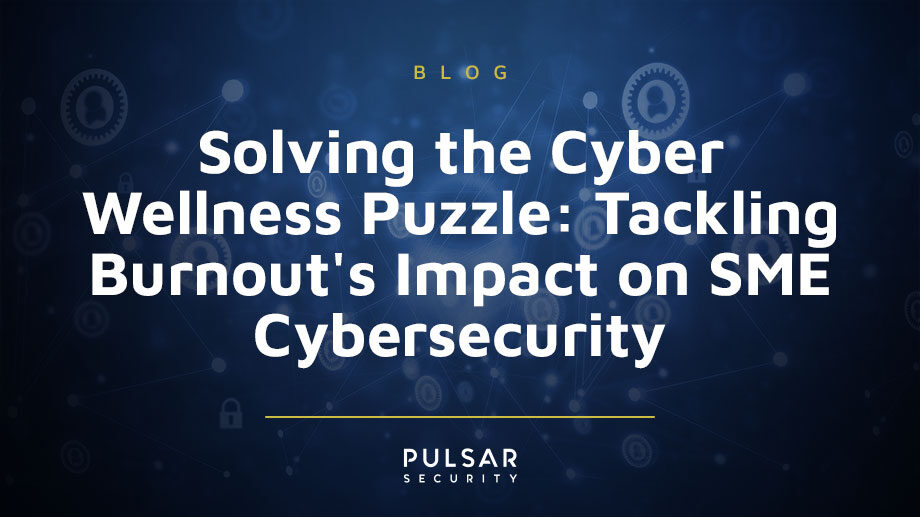Solving the Cyber Wellness Puzzle: Tackling Burnout's Impact on SME Cybersecurity
The struggle against digital hazards is unending in the rapidly evolving cybersecurity world. Experts confront obstacles that transcend the digital interface. The relentless strain, high expectations of performance, and the ever-changing cyber risk landscape can profoundly affect the psychological well-being of those working in cybersecurity. This is further compounded by the need to stay ahead of sophisticated threat actors, the complexity of managing diverse security architectures, and the responsibility of safeguarding sensitive organizational data.
The cyber threat environment is an unyielding war zone. As professionals in this harsh domain, we assume various roles — planners, pioneers, risk reducers, and leaders. Amid this perpetual state of vigilance, it’s simple to neglect our most vital safeguard: our team, the cybersecurity experts who maintain vigil around the clock. They are the first line of defense, the human firewall, the skilled minds decoding cryptic scripts and fending off malicious intrusions.
However, we must confront a harsh reality: they are reaching a point of exhaustion.
It’s crucial to remember that while technology plays a significant role in cybersecurity, the human element often makes the difference.
The numbers paint a bleak scenario
Data from recent studies reveal a concerning trend. For instance, according to a Forrester analysis from last year, an overwhelming 66% of cybersecurity professionals are grappling with acute stress and burnout, with 51% requiring pharmaceutical intervention and 19% turning to the habitual intake of three alcoholic beverages daily to manage the tension. This takes a toll on personnel and causes a weakness in business resilience.
Burnout endangers the security of our digital fortresses in a field already facing a critical shortfall of 4 million experts.
In a different survey, only 47% of cybersecurity experts reported having a good mental health status. A concerning 27% indicated that their mental health has deteriorated over the past year. Also, 66% admitted to experiencing work-related stress, and 64% acknowledged that their mental health impacts their productivity. Furthermore, 51% have been prescribed medication to manage their mental health issues.
An additional industry report, ‘The Life and Times of the Cybersecurity Professional,’ reveals that 55% of cybersecurity experts admit to feeling stressed at work about half the time. This stress level is so significant that 21% of these professionals contemplate exiting the field. The study further discloses that due to the intense burnout rates, 28% of Chief Information Security Officers (CISOs) are considering leaving their current positions.
In addition, a 2023 report revealed that due to the stress induced by generative AI, 51% of cybersecurity experts might consider quitting their jobs in the forthcoming years. Additionally, 55% of these professionals have reported a rise in stress levels recently, primarily attributed to the absence of a fully-equipped cybersecurity team or one possessing the required skills.
These factors significantly influence the emotional well-being of cybersecurity professionals. For instance, persistent negative emotions can culminate in burnout.
These figures underscore the pressing need for mental health support and stress management strategies in the cybersecurity industry. Moreover, this data highlights the urgent need for organizations to address workplace stress and burnout proactively. After all, retaining skilled cybersecurity professionals is crucial in the face of increasing cyber threats and a growing talent gap in the industry.
The costs of burnout on SME cybersecurity
1. Automatic Routine
The concept of an ‘Automatic Routine’ is a double-edged sword. On one hand, it allows us to manage the vast array of tasks that come with cybersecurity requirements. On the other hand, it can lead to a mechanical execution of responsibilities, reducing efficiency and attention to critical details.
The danger lies in the monotony. When tasks become routine, our minds tend to switch to autopilot. We perform actions without conscious thought, and while this can make us more efficient in some ways, it can also lead to oversights. Critical details can be missed, and the quality of our work can suffer.
Moreover, this automatic routine can contribute to the burnout we’re trying to prevent. The lack of mental stimulation, repetition, and the feeling of being on a treadmill can lead to mental fatigue, dissatisfaction, and, ultimately, burnout.
2. Making Impulsive Decisions that Cause Unwanted Outcomes
Impulsive decisions are a dangerous pitfall. A professional operating on autopilot may make hasty decisions or adhere to procedures without careful consideration, escalating the likelihood of mistakes.
This mindlessness, this lack of conscious awareness, can be a silent saboteur. It can lead to misjudgments and errors that can have serious consequences. In cybersecurity, a single mistake can open the door to a cyberattack, compromising the security of an entire network.
Impulsive decisions and thoughtless adherence to processes are signs of a mind under stress, a mind on the brink of burnout. It’s a cry for help that we must not ignore.
3. Disconnection from Work
Disconnection from work is a silent enemy. A lack of conscious presence can lead to an emotional disconnect from the work environment and team members. This detachment is detrimental to the individual, the entire team, and the organization.
In the high-stakes game of cybersecurity, teamwork is crucial. We rely on each other’s skills, knowledge, and perspectives to navigate the complex landscape of cyber threats. But when one of us becomes disconnected, it affects us all. The synergy is lost, weakens collaboration, and compromises the team’s effectiveness is compromised. Disconnection is often a symptom of burnout. The constant stress, relentless pace, and overwhelming responsibility can lead to a sense of disconnection.
4. More Employees Leaving the Organization
Burnt-out professionals may seek less stressful work environments, increasing company recruitment costs. Increased turnover leads to the loss of talent, knowledge, experience, and continuity.
Moreover, increased employee turnover is costly in terms of recruitment and lost productivity. The new hires may take time to get up to speed, learn the ropes, and become as effective as the professionals they replaced. During that time, the team’s effectiveness may be compromised.
But there’s a bigger issue at play here: the impact on the team’s morale. When team members see their colleagues leaving, they may question their situation. They may start to feel the stress more acutely and worry about their own risk of burnout.
Addressing burnout’s effect on SME cybersecurity
While technology plays a pivotal role in cybersecurity, the human element often tips the scales. Machines can analyze data, but the human mind interprets it, sees patterns, and makes connections. Machines can detect threats, but the human instinct senses danger, anticipates attacks, and devises strategies. And yet, we are pushing these invaluable human resources to their limits.
The war against cyber threats is not just a battle of technology; it’s a battle of wills. And to win this battle, we need our cybersecurity professionals to be at their best - physically, mentally, and emotionally.
However, tackling burnout extends beyond interventions at the individual level. It calls for a strategic and systemic approach that targets the underlying issues. Organizations must construct sustainable frameworks that bolster and augment the resilience of their cybersecurity personnel.
A key factor contributing to burnout is the immense workload shouldered by IT teams. As businesses undergo digital transformation, they gain access to many solutions, each offering unique advantages. However, this comes with the downside of an escalating workload for IT professionals.
Therefore, solutions that integrate multiple functionalities are crucial in alleviating this workload. For instance, deploying a unified endpoint management (UEM) solution can streamline device, application, and patch management into a single interface. This simplifies the task for IT professionals and enhances efficiency and effectiveness in managing cybersecurity threats. Ultimately, such strategic measures can significantly reduce burnout and promote a healthier work environment in the cybersecurity industry.
Take, for example, partnering with Pulsar Security. The company provides a comprehensive package of services designed to bring maximum security benefits and quality. With such capabilities, you can effectively perform external and internal vulnerability assessments, penetration tests, dark web assessments, scan connected USB devices, receive real-time threat alerts, and more.
Prevent burnout from impacting your cybersecurity
Outsourcing cybersecurity functions to Pulsar Security is a strategic move that brings numerous benefits. Firstly, Pulsar Security boasts a team of certified professionals well-versed in the latest cybersecurity practices. They leverage state-of-the-art technologies to secure your organization, ensuring your digital assets are well-protected against evolving threats.
As such, entrusting your cybersecurity to Pulsar Security allows you to alleviate the burden on your internal team, effectively eliminating the risk of burnout. This lets your team focus on their core competencies, enhancing productivity and innovation.
Moreover, Pulsar Security offers a comprehensive suite of cybersecurity services, from threat detection and response to risk management and compliance. Their proactive approach ensures that potential threats are identified and mitigated before they can cause harm.
In addition, Pulsar Security’s scalable solutions grow with your business, ensuring that your cybersecurity posture remains robust regardless of your company’s size or the complexity of your IT infrastructure.
In conclusion, outsourcing your cybersecurity functions to Pulsar Security safeguards your organization against cyber threats and promotes a healthier work environment by preventing burnout. It’s an investment in the security of your digital assets and the well-being of your team. So, take the step today and let Pulsar Security be your trusted partner in navigating the complex cybersecurity landscape.

Marshall Thompson
Marshall is a Security Consultant and Software Engineer with a wide range of talents across development, penetration testing, and cloud services. Marshall plays a large role in the development of enterprise software at Pulsar Security, specializing in .NET, MSSQL, Azure, Active Directory, C#, and Python.




